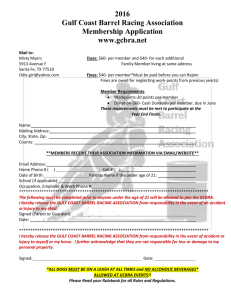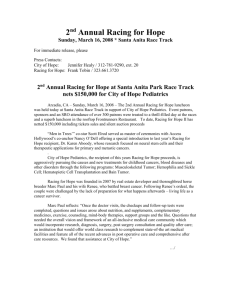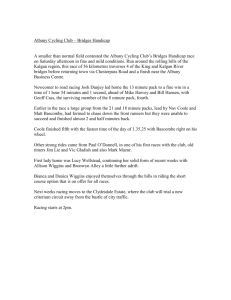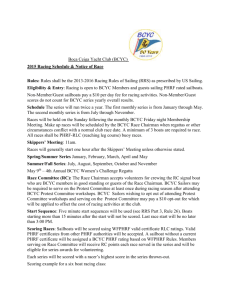international opportunities
advertisement
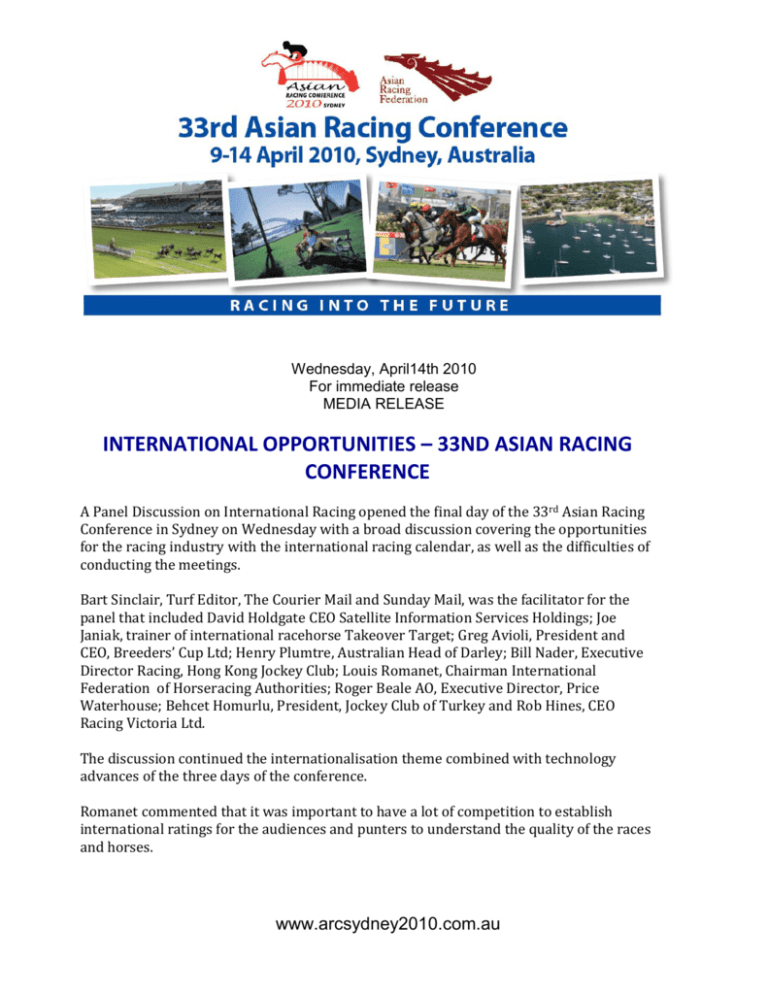
Wednesday, April14th 2010 For immediate release MEDIA RELEASE INTERNATIONAL OPPORTUNITIES – 33ND ASIAN RACING CONFERENCE A Panel Discussion on International Racing opened the final day of the 33rd Asian Racing Conference in Sydney on Wednesday with a broad discussion covering the opportunities for the racing industry with the international racing calendar, as well as the difficulties of conducting the meetings. Bart Sinclair, Turf Editor, The Courier Mail and Sunday Mail, was the facilitator for the panel that included David Holdgate CEO Satellite Information Services Holdings; Joe Janiak, trainer of international racehorse Takeover Target; Greg Avioli, President and CEO, Breeders’ Cup Ltd; Henry Plumtre, Australian Head of Darley; Bill Nader, Executive Director Racing, Hong Kong Jockey Club; Louis Romanet, Chairman International Federation of Horseracing Authorities; Roger Beale AO, Executive Director, Price Waterhouse; Behcet Homurlu, President, Jockey Club of Turkey and Rob Hines, CEO Racing Victoria Ltd. The discussion continued the internationalisation theme combined with technology advances of the three days of the conference. Romanet commented that it was important to have a lot of competition to establish international ratings for the audiences and punters to understand the quality of the races and horses. www.arcsydney2010.com.au Romanet also said that a major problem for broadcasting of international racing was races starting on time. However he said that a dedicated racing channel operating 24 hours a day combined with co-mingling and international ratings would drive wagering. He said that when Japan and Hong Kong joined with co-mingled pools with elsewhere in the world, which he was confident that they would, that this would be of considerable interest to big punters. Avioli told the conference that next year’s Breeders’ Cup would be broadcast in 3D, but with the increased sophistication of broadcasting several panel members commented that it was in racings interests to ensure that there were gaps between races for viewers and punters to take in the spectacle of racing, and ratings of the next race. Hines questioned the strategy of broadcasting too much racing. “It can become like playing a poker machine,” he said referring to broadcasts that had back to back racing. “We have to try and get the atmosphere of racing through to the punter,” said Holdgate. “We have to have gaps in racing. People are used to watching major sports throughout the week, such as football and golf, and we have to compete to capture that atmosphere,” he said. Avioli said that the last Breeders’ Cup meeting in California had attracted 22 million viewers from 130 countries. www.arcsydney2010.com.au While the Breeders’ Cup had considered travelling overseas for a meeting Avioli thought this was unlikely due to their major revenue base for wagering being in the USA and time zones would have an adverse impact on that base. He also revealed that the policy of travelling with the meetings throughout the USA might stop to base the meeting at one course in the same manner as other major international meetings throughout the world. Romanet said that France first co-mingled with the Breeders’ Cup meeting in 1997 with US$1 million being waged. Ten years later the pool was US$5 million with better quality pictures driving wagering and French punters appreciating the large pool that comingling presented. The difficulties of quarantine when travelling horses to meetings was discussed with Janiak saying that if he had another horse that was good enough to travel he would seriously consider not travelling, such are the demands of quarantine. “Horses get diseases and humans spread them,” said Plumptre. “We need good interaction between clubs and countries if we want international racing on a regular basis,” he said. Beale, who chaired the Australian inquiry into the 2008 equine influenza outbreak in NSW and Queensland, made the point to the panel that race horses are a very small part of the total animal trade. www.arcsydney2010.com.au “Australia is always going to be tough on the movement of horses to protect other huge agricultural industries,” he said. Beale cited a potential cost of $14 billion dollars to Australia if foot and mouth disease reached the country and said that government would always give more weight to the protection of the agriculture industry over relaxing controls for international horses. The panel agreed that international horses create public interest with Dale Monteith, CEO of the Victoria Racing Club, speaking from the conference floor, saying that the measure of free media publicity for the Melbourne Cup Carnival was rated at $45 million. Monteith quoted the increase in crowd figures from the advent of international horses competing in the Melbourne Cup as being from 200,000 to 400,000 over the four day carnival. Nader said that over the next 10 years there would be more horses flying to compete internationally and that these meetings needed to be used to cut through the ‘clutter’ of regular racing with television and media used to make the days like Olympic meetings. Holdgate said that co-mingling developed international racing with familiar bets for all punters with a level playing field for all wagering operators with good liquidity in the markets. “But we have to have vision and data together,” he said. www.arcsydney2010.com.au An online search facility was being worked on reported Nader for the Asian region where trainers would be able to access all Asian Racing Federation countries for all detail on their international races including race replays for the past five years, results, ratings and quarantine and travel information. “This will enable trainers to search what is require to compete at these meetings and it is important for the ratings to be the measure of the races and horses,” he said. Homurlu spoke of the advances by the Jockey Club of Turkey with international racing. Wagering on international races has increased 30% with eight international races held in Turkey with two of Group Two ICS standard. “International racing increases the quality of home racing, the quality of horses and betting,” said Homurlu. Foreign jockeys are now allowed to ride in Turkey and Turkish apprentices are being sent aboard for further experience. “We believe international racing will be one of the key issues of racing,” he summed up while thanking Romanet for his assistance in advancing Turkey’s internationalisation. A Hypothetical session later in the conference confirmed both the importance of internationalisation and the difficulties. www.arcsydney2010.com.au Avioli said that co-mingling was not moving fast enough to give racing customers the best product it could, while Nader explained the double taxation issue with the Hong Kong government that prevented co-mingling into that market, and Hiroshi Ito, Chief Technical Adviser of Japan Racing Association, said that all domestic wagering operators in Japan would have to agree on horse racing being able to co-mingle. The panel all agreed with the need to standardise bet types and names, betting regulations, rules of racing and wagering software. Guy Sargent, Chairman NZTR Board, said that New Zealand had standardised its rules and track information with Australia for co-mingling. “We were looking at the punters end of the chain,” said Sargent. “Co-mingling will drive the world together,” he said. Alan Brown, Chairman Racing NSW, said that common bet types were being worked out with Singapore before the launch of co-mingling with that market. “We also need course and country branding of races on our screens,” said Brown. The conference concluded on Wednesday. “We set out to challenge delegates thinking and broaden their views,” said Brown, who chaired the Conference Organising Committee. www.arcsydney2010.com.au “With the help of the speakers we have achieved that. “We set ourselves high standards when we accepted the conference and I am more than satisfied that we met those standards. “All the feedback from the delegates has been amazingly positive,” he concluded. A veteran of Asian Racing Conferences Ted Bailey, a former chairman of the Darwin Turf Club for 13 years, said that he had been attending since 1988. “The quality of all the presentations was excellent and these have been the most constructive panels I have seen,” said Bailey. ENDS For further information Rob Burnet Media Tel: 61 414 867 609 www.arcsydney2010.com.au

